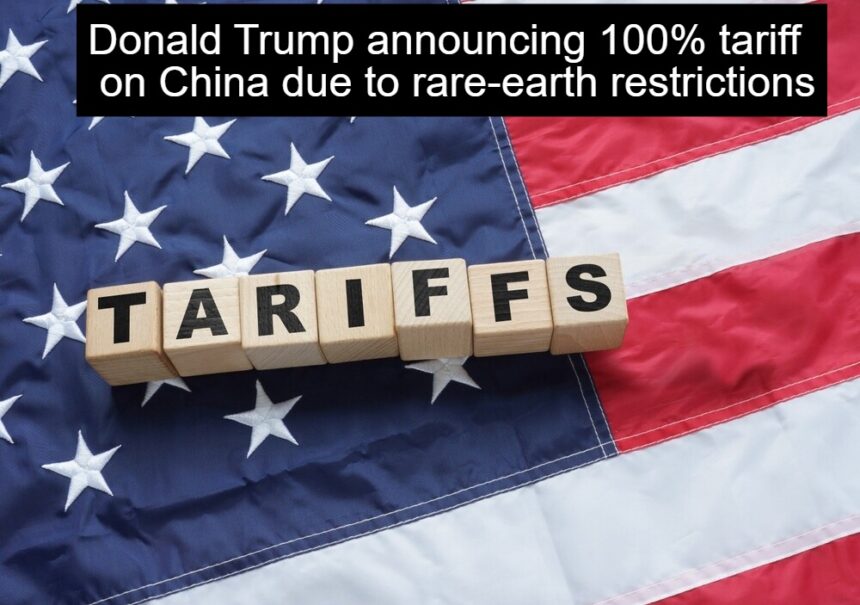In a significant move that has sent shockwaves through global markets, former President Donald Trump announced the imposition of a 100% tariff on Chinese imports, citing concerns over rare-earth element restrictions. This drastic measure comes amid escalating tensions between the United States and China, particularly in the technology and manufacturing sectors where rare-earth elements play a crucial role. As both nations brace for potential economic fallout, the implications of this decision extend far beyond trade, potentially reshaping supply chains, consumer prices, and the dynamics of international relations. This article explores the context of the tariffs, their impact on U.S.-China relations, and the broader economic consequences on American businesses and global markets.
Overview of Trump’s Tariff Announcement
In a move that has left jaws on the floor and analysts scratching their heads, former President Trump has announced a stunning 100% tariff on imports from China. This eyebrow-raising decision comes amid ongoing discussions about supply chain vulnerabilities and geopolitical tensions. With such an audacious rate, it’s clear Trump is not playing around when it comes to asserting economic pressure on the Chinese.
Details of the 100% Tariff
The specifics of the 100% tariff are as straightforward as they are shocking: essentially, any goods imported from China will now be subject to a tax that doubles their cost. This means that if a product originally cost $100, American consumers will now pay a whopping $200. Expect prices to rise on everything from electronics to clothing—unless you want to take a field trip to your local black market.
Reasons Behind the Decision
So, what led to this bold tariff slap? The ostensible reason is to counteract China’s perceived unfair trade practices and recent restrictions on the export of rare-earth elements. Trump’s administration argues this move is an essential tactic to protect American industries and bolster national security. After all, nothing says “happy trading” like slapping on a 100% tariff!
In his Truth Social post, Trump accused China of taking an “extraordinarily aggressive” stance and called its actions “a moral disgrace in international trade.”
https://truthsocial.com/@realDonaldTrump/posts/115351840469973590
The Context of Rare-Earth Restrictions
Rare-earth elements, often overshadowed by the headlines about gold and diamonds, are actually crucial to modern technology. They’re used in everything from smartphones to electric vehicles and even in national defense systems. Think of them as the unsung heroes of the tech world—the “Avengers,” if you will, but less flashy and more powdered.
Definition and Importance of Rare-Earth Elements
Rare-earth elements consist of 17 chemical elements that are found in the Earth’s crust. While the name suggests they are hard to find, they are actually quite abundant; however, extracting them is a different story. Their significance lies in their specialized applications in high-tech industries and renewable energy, making them essential for ensuring that your gadgets work efficiently and your electric car keeps running.
China’s Dominance in Rare-Earth Production
China has positioned itself as the kingpin of rare-earth production, controlling approximately 60% of global supply. This monopoly has given China a significant bargaining chip in international relations, and by imposing restrictions on exports, they can easily hold other countries hostage. Think of it as a game of Monopoly, where China has all the properties, and anyone else is just hoping to avoid landing on “Go to Jail.”
Implications for U.S.-China Trade Relations
The U.S.-China trade relationship has been like a rollercoaster ride—lots of ups, downs, and a few unexpected twists! Historical tariff wars have set a precedent for how these two giants interact, and Trump’s latest gambit is likely to add more drama to this already tense saga.
Historical Context of Tariff Wars
The seeds of tariff wars were planted long before Trump took office; trade disputes have been simmering for years, rooted in issues like intellectual property theft and trade imbalances. The introduction of tariffs by both countries has often been met with retaliatory measures, creating a cycle of escalating tensions reminiscent of a soap opera with shocking plot twists at every corner.
Potential for Escalation in Trade Tensions
As you might imagine, this latest tariff could lead to a fiery escalation in trade tensions. If both countries continue to retaliate, we could see an all-out trade war that sends shockwaves through global markets. Buckle up, because in the world of U.S.-China trade relations, things can change faster than a TikTok trend.
Economic Impact on American Businesses
The repercussions of these tariffs are poised to hit American businesses like a freight train—especially those reliant on Chinese imports. While some sectors may bask in the glory of reduced competition, many others are preparing for a rough ride ahead.
Sectors Most Affected by Tariffs
Industries heavily reliant on rare-earth elements—like electronics, automotive, and renewable energy—are bracing for impact. Manufacturers might find their production costs soaring, leading to tighter profit margins. Retailers can expect shoppers to have a lot fewer pennies to spare—making “affordable luxury” sound like an oxymoron.
Consumer Prices and Market Stability
As the saying goes, when the economy sneezes, consumers catch a cold. With prices climbing and uncertainty looming, everyday Americans may feel the pinch at the checkout line. No more “buy one, get one free” as prices escalate—even the sale racks might look a little bare. Thus, the market stability we took for granted could become a thing of the past, leaving consumers and businesses alike crossing their fingers for clearer skies ahead.
Potential Responses from China
Strategic Measures China May Implement
In true chess-master fashion, China is likely plotting its next moves. Expect a mix of tit-for-tat tariffs, trade restrictions on U.S. goods, and perhaps even a squeeze on critical supplies that could leave American industries in a bind. Reports suggest they may also look at diplomatic channels to rally international support against U.S. actions, all while reminding the world that they hold the rare-earth ace up their sleeve.
Impact on Bilateral Negotiations
With tensions escalating, the prospect of amicable negotiations seems about as likely as finding a unicorn at a Starbucks. The new tariffs complicate any ongoing discussions, making compromise harder to reach. Both sides may end up playing a high-stakes game of economic chicken, which is sure to create a rollercoaster atmosphere for global trade.
Reactions from Global Markets
Market Response to Tariff Announcement
Upon hearing the news of the 100% tariff, global markets collectively gasped, much like your favorite soap opera characters when a long-lost relative suddenly returns. Stock prices around the world reflected this shock, with fluctuations that could rival a heavy metal concert’s decibel levels. Investors hunkered down, unsure if this was the beginning of a financial tempest or just another squall in the ongoing trade war.
Investor Sentiment and Predictions
Investor sentiment is at an all-time low, with many believing that the U.S.-China trade relationship is hanging by a thread—like your favorite set of headphones after a month of vigorous use. Predictions vary widely, from doomsday scenarios where markets crash to the other end of the spectrum, where savvy investors find a silver lining in disrupted business models. It’s a risky game that some are more willing to play than others.
Long-term Consequences for Rare-Earth Supply Chains
Shifts in Global Supply Chain Strategies
As companies scramble to adapt, expect a seismic shift in global supply chain strategies. Businesses might start diversifying their supply sources, seeking alternatives that aren’t dependent on Chinese rare earths—because, let’s face it, nobody wants to put all their eggs in one basket, particularly if that basket is sitting on a trade war minefield.
Emerging Alternatives to Chinese Rare Earths
Hello, competitors! Countries like Australia, Canada, and even the U.S. are stepping up their game in rare earth mineral production. This creates new opportunities for mining companies and may potentially reduce reliance on Chinese supplies. However, the transition won’t be smooth—think of it as trying to switch from coffee to green tea overnight—not everyone’s going to love it.
Conclusion: Future of U.S.-China Economic Policy
Possible Scenarios Moving Forward
The future of U.S.-China economic policy could unfold in multiple ways: we could see an eventual thaw in relations leading to new agreements, or we might spiral deeper into economic disengagement. If we learned anything from soap opera plot twists, it’s that the most unpredictable scenarios can sometimes be the most exciting—though we’d prefer less drama in our international relations.
Broader Implications for Global Trade Dynamics
What happens when two economic powerhouses engage in a duel? The ripples can be felt worldwide, affecting global supply chains, market strategies, and international partnerships. Countries may find themselves reevaluating their own trade relationships, leading to a reconfiguration of global trade dynamics. In essence, the world is watching closely, holding its breath for the next chapter in this high-stakes saga.As the situation unfolds, the ramifications of Trump’s 100% tariff on China will likely reverberate through economies worldwide, challenging established trade practices and prompting reevaluation of supply chains. The responses from both nations will be critical in determining the future trajectory of U.S.-China relations and the global market landscape. Ultimately, the true impact of this decision will become clearer in the coming months as businesses and governments navigate the complexities of this renewed trade conflict.
FAQ
What are rare-earth elements and why are they important?
Rare-earth elements are a group of 17 chemically similar elements essential for the manufacturing of various high-tech products, including smartphones, electric vehicles, and defense systems. Their unique properties make them crucial for modern technologies.
How will the 100% tariff affect American consumers?
The 100% tariff on Chinese imports may lead to increased prices for goods that rely on rare-earth elements and other affected products, potentially resulting in higher costs for consumers and impacting inflation rates.
What potential actions might China take in response to these tariffs?
China may respond with its own tariffs, restrictions on exports, or other trade measures aimed at retaliating against the U.S. actions. This could escalate tensions further and complicate future negotiations between the two countries.
What are the long-term implications of these tariffs for global trade?
The tariffs could lead to a significant reshaping of global trade dynamics, encouraging countries to diversify their supply chains and seek alternatives to Chinese rare-earth sources, which may alter existing trade relationships and market stability.

